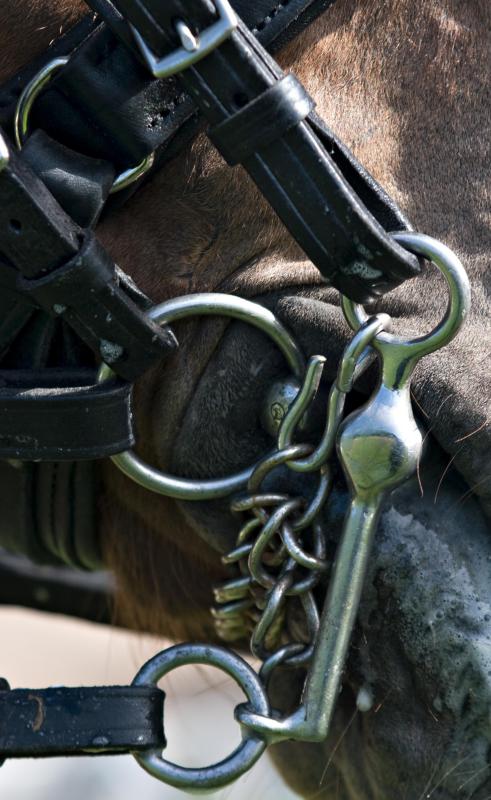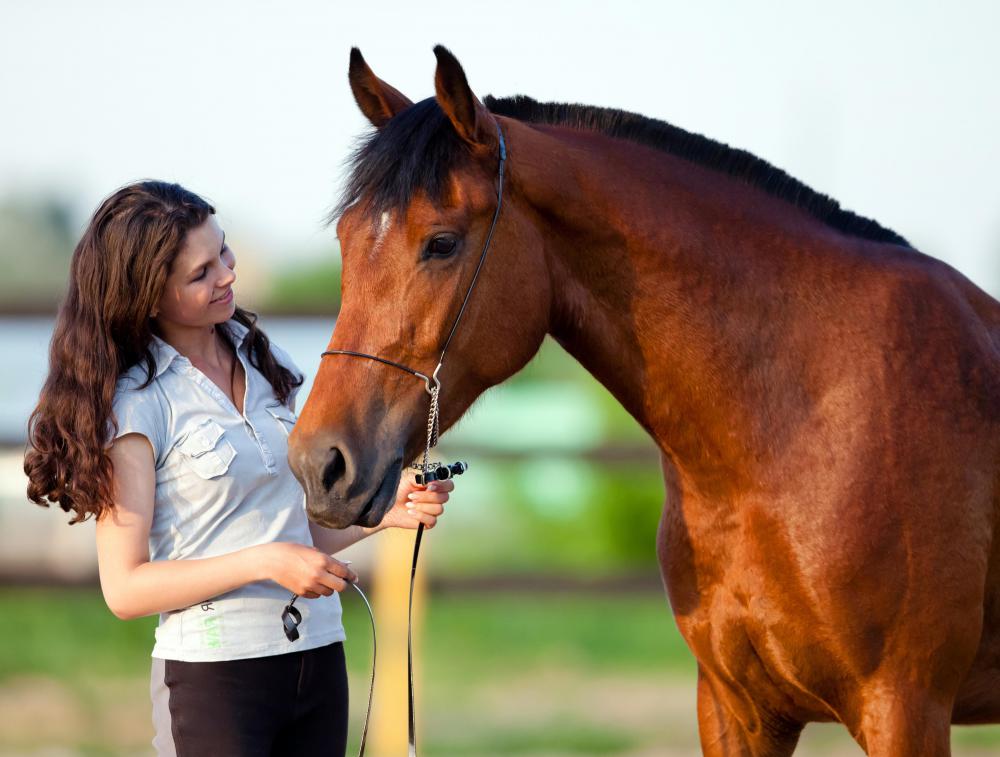At AllThingsNature, we're committed to delivering accurate, trustworthy information. Our expert-authored content is rigorously fact-checked and sourced from credible authorities. Discover how we uphold the highest standards in providing you with reliable knowledge.
In Horse Training, what is Intelligent Refusal?
In the training of horses, some may be taught intelligent refusal, in which they learn to analyze a situation to determine whether or not it is unsafe, and to take action accordingly. A horse which has learned intelligent refusal will not do something which it deems to be unsafe. This training technique is also used to train service animals like guide dogs.
Horses are naturally intelligent, sensitive animals, although some breeds can be a bit high strung. Like many ungulates, they also have a very refined sense of danger, thanks to thousands of years as prey to larger animals. They are also attuned to small changes in the natural environment which could signal things like unstable ground, dangerous ice, or loosely rooted trees which could fall. When intelligent refusal is integrated into a training program, it takes advantage of these natural horse traits.

In addition to protecting the welfare of the animal, intelligent refusal also protects its handler. In the case of guide dogs, for example, a dog will not cross the street when it is not safe. In the case of a horse, intelligent refusal might involve not taking a jump which is too high, or refusing to wade or swim a river with a dangerous current. A horse which has learned intelligent refusal will be a safer, more secure mount, especially for younger and more inexperienced riders.

Some horses, especially ponies, are innately smart about the dangers of potential activities, and the principle of intelligent refusal does not need to be taught because the horse will simply refuse to do dangerous things by nature. In a sense, intelligent refusal could be thought of as common sense for horses. In the case of ponies, riders need to learn to distinguish between intelligent refusal and a simple desire not to do something, although a well trained pony should not refuse a safe command once it has been given.

The concept of intelligent refusal is often integrated into natural horsemanship and other holistic horse training techniques. It assumes that horses should not ignore their innate intelligence and centuries of evolution, and that an active decision on the part of the horse to be smart in a particular situation could be extremely useful. While horses have a history of intelligent refusal in extreme circumstances, trainers attempt to hone it, teaching the horse that it is appropriate to ignore or refuse a command in certain situations.
Frequently Asked Questions
What is an intelligent refusal in horse training?

An intelligent refusal occurs when a horse, often during jumping, decides not to attempt a jump that it perceives as unsafe or beyond its capabilities. This decision is based on the horse's instinct for self-preservation and can be a sign of trust in the horse-rider partnership, indicating the horse's confidence to act on its judgment.
How can you tell if a refusal is intelligent rather than disobedient?
A refusal is likely intelligent if the horse approaches the jump attentively but stops, indicating it has assessed the risk. Disobedience, on the other hand, may involve the horse acting out, such as turning away or bucking, without showing signs of careful consideration of the obstacle ahead.
Should an intelligent refusal be punished in horse training?
No, an intelligent refusal should not be punished. It is important to recognize the horse's judgment and address any underlying issues, such as the jump's height or the horse's health. Punishing a horse for an intelligent refusal can erode trust and may lead to more serious accidents in the future.
How can a rider respond to an intelligent refusal during training?
When faced with an intelligent refusal, a rider should remain calm and assess the situation. They should consider the horse's perspective, check for any physical issues, and ensure the jump is appropriate. The rider can then work on building confidence and trust, perhaps by lowering the jump or approaching it at a different angle.
Can intelligent refusal be a sign of a good horse-rider relationship?
Yes, intelligent refusal can indicate a strong horse-rider relationship, where the horse feels secure enough to communicate its discomfort or concern. It shows that the horse trusts the rider to listen and respond to its needs, which is a cornerstone of successful horse training.
How can trainers prevent intelligent refusals?
Trainers can prevent intelligent refusals by ensuring that the horse is physically and mentally prepared for the task. This includes proper conditioning, gradual training progression, and creating a positive learning environment. It's also crucial to listen to the horse's feedback and adjust training methods accordingly to maintain confidence and safety.
AS FEATURED ON:
AS FEATURED ON:














Discuss this Article
Post your comments